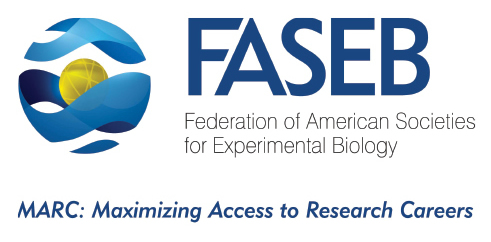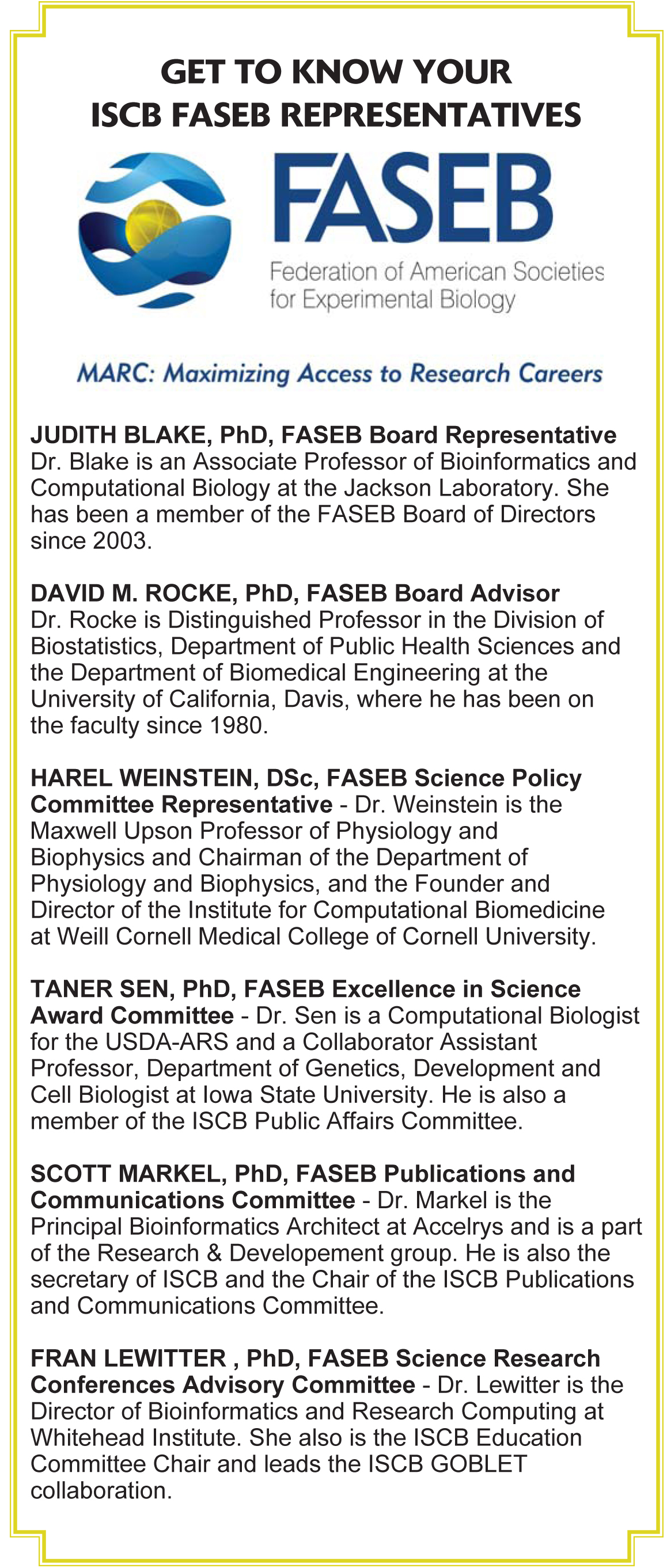| |
2014 FASEB UPDATES FOR ISCB
By Allison Lea and Jennifer Zeitzer
 ISCB is a member of the
Federation of
American Societies for Experimental Biology (FASEB), a coalition
of 27 scientific societies representing over 120,000 researchers
from around the world. FASEB works to promote biological research
and has become an organization that legislators, federal agencies,
and the media turn to for information on policies related to
biomedical science and engineering. ISCB is a member of the
Federation of
American Societies for Experimental Biology (FASEB), a coalition
of 27 scientific societies representing over 120,000 researchers
from around the world. FASEB works to promote biological research
and has become an organization that legislators, federal agencies,
and the media turn to for information on policies related to
biomedical science and engineering.
FASEB's Office of Public
Affairs (OPA) staff and FASEB elected leaders meet regularly with
National Institutes of Health (NIH) and National Science Foundation
(NSF) officials to provide the prospective of the membership on a
wide range of issues. On May 30, NIH Deputy Director, Kathy Hudson,
PhD, spoke to FASEB's public affairs staff and society staff about
upcoming and ongoing NIH initiatives, including Big Data to
Knowledge (BD2K)
and Brain Research through Advancing Innovative Neurotechnologies (BRAIN).
That same day, FASEB met with Phil Bourne, PhD, NIH's first
Associate Director for Data Science. Dr. Bourne discussed the
challenges NIH is facing with data sharing and the initiatives in
the NIH pipeline to address them. For example, NIH plans to build
The Commons -- a public database that will be a part of a
public-private partnership between government, academia, and
industry to support data sharing and pre competitive collaboration
to further scientific discovery. BD2K will support The Commons with
data discovery index, software development, training centers, and
grants.
On June 2, newly appointed NSF Director France
Cordova, PhD, spoke at the FASEB Board meeting, where she shared
NSF's priorities and initiatives, such as fundamental research for
climate change, the BRAIN Initiative, promoting clean energy,
collaborating with other federal agencies, and promoting minorities
in science. She also recognized and praised FASEB for its support of
the federal science agencies.
Federal Funding for
Biomedical Research
This spring, FASEB released its
factsheets demonstrating fiscal year (FY) 2013 NIH funding for
all 50 states, DC, and Puerto Rico. In an effort to increase federal
funding for biomedical research, Senator Tom Harkin (D-IA) sent a
"Dear Colleague" letter to the members of the U.S. Senate
highlighting the FASEB factsheets as an example of the critical
support NIH provides to thousands of investigators around the
country. Senator Harkin has been a long-time supporter of biomedical
research and an advocate on Capitol Hill for increased funding for
NIH.
The budget agreement Representative Paul Ryan (R-WI) and
Senator Patty Murray (D-WA) reached in December has paved the way
for Congress to get an early start on the FY 2015 spending bills.
Having achieved consensus on the top-line spending limit ($1.014
trillion), the Appropriations Committees have made progress on the
legislation that funds the federal agencies, including NIH and NSF.
The Senate Appropriations Committee
passed the Commerce, Justice, and Science (CJS) bill by a
unanimous 30-0 vote, providing $7.2 billion for NSF (the same as
President Obama's request and the FY 2014 level). Senator Richard
Shelby (R-AL) noted that the Ryan-Murray deal left the appropriators
with "extremely tough choices" to make. NSF would fare slightly
better under the CJS bill (HR 4660) approved by the House on a
bipartisan vote of 321-87. The House raised NSF's budget to $7.41
billion, an increase of $237 million or 3.3 percent over the FY 2014
level.
On June 10, the Senate Labor, Health and Human
Services (LHHS) Appropriations Subcommittee approved a bill that
provides $30.45 billion for NIH, an increase of $605 million (1.8
percent) above the FY 2014 level. A press release summarizing the
bill notes that the NIH funding level "is sufficient, when combined
with the $1,000,000,000 increase appropriated in FY 2014, to fully
replace the FY 2013 sequester cut to NIH." The Senate LHHS bill must
still be approved by the full Appropriations Committee. The House
has not yet considered the NIH funding measure.
Regulatory Burden
In March, the National Science
Board (NSB) released its report, Reducing Investigators'
Administrative Workload for Federally Funded Research, which
included the following overarching recommendations: (1) postpone
certain administrative requirements until the grant proposal has
been approved; (2) eliminate or modify ineffective regulations; (3)
harmonize and streamline requirements; and (4) increase university
efficiency and effectiveness. These proposals are similar to the
recommendations FASEB made in May 2013 in response NSB's Request for
Information on administrative burdens. FASEB's response was drawn
from the feedback provided by FASEB's Science Policy Committee and a
survey of over 1,300 scientists conducted by the Federation. FASEB
will continue to work with the NSB and federal agencies as they seek
ways to implement these recommendations.

top |

